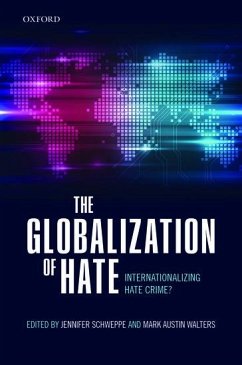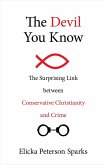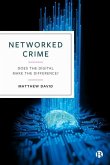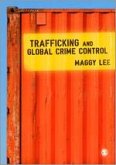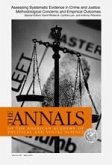The Globalization of Hate: Internationalising Hate Crime?
Herausgeber: Schweppe, Jennifer; Austin Walters, Mark
Schade – dieser Artikel ist leider ausverkauft. Sobald wir wissen, ob und wann der Artikel wieder verfügbar ist, informieren wir Sie an dieser Stelle.
The Globalization of Hate: Internationalising Hate Crime?
Herausgeber: Schweppe, Jennifer; Austin Walters, Mark
- Gebundenes Buch
- Merkliste
- Auf die Merkliste
- Bewerten Bewerten
- Teilen
- Produkt teilen
- Produkterinnerung
- Produkterinnerung
Brings together internationally acclaimed scholars with researchers, policy makers and practitioners from across the world to critically scrutinise the concept of hate crime as a global phenomenon. It seeks to examine whether hate crime can, or should, be conceptualised within an international framework and, if so, how this might be achieved.
Andere Kunden interessierten sich auch für
![Hate Crime Hoax Hate Crime Hoax]() Wilfred ReillyHate Crime Hoax24,99 €
Wilfred ReillyHate Crime Hoax24,99 €![The Devil You Know: The Surprising Link Between Conservative Christianity and Crime The Devil You Know: The Surprising Link Between Conservative Christianity and Crime]() Elicka Peterson SparksThe Devil You Know: The Surprising Link Between Conservative Christianity and Crime23,99 €
Elicka Peterson SparksThe Devil You Know: The Surprising Link Between Conservative Christianity and Crime23,99 €![Shattered Justice: Crime Victims' Experiences with Wrongful Convictions and Exonerations Shattered Justice: Crime Victims' Experiences with Wrongful Convictions and Exonerations]() Kimberly J. CookShattered Justice: Crime Victims' Experiences with Wrongful Convictions and Exonerations165,99 €
Kimberly J. CookShattered Justice: Crime Victims' Experiences with Wrongful Convictions and Exonerations165,99 €![Crime and Human Rights Crime and Human Rights]() Joachim SavelsbergCrime and Human Rights149,99 €
Joachim SavelsbergCrime and Human Rights149,99 €![Networked Crime Networked Crime]() Matthew DavidNetworked Crime165,99 €
Matthew DavidNetworked Crime165,99 €![Trafficking and Global Crime Control Trafficking and Global Crime Control]() Maggy LeeTrafficking and Global Crime Control203,99 €
Maggy LeeTrafficking and Global Crime Control203,99 €![Assessing Systematic Evidence in Crime and Justice Assessing Systematic Evidence in Crime and Justice]() David L Weisburd / Anthony Petrosino / Cynthia M LumAssessing Systematic Evidence in Crime and Justice96,99 €
David L Weisburd / Anthony Petrosino / Cynthia M LumAssessing Systematic Evidence in Crime and Justice96,99 €-
-
-
Brings together internationally acclaimed scholars with researchers, policy makers and practitioners from across the world to critically scrutinise the concept of hate crime as a global phenomenon. It seeks to examine whether hate crime can, or should, be conceptualised within an international framework and, if so, how this might be achieved.
Produktdetails
- Produktdetails
- Verlag: Oxford University Press, USA
- Seitenzahl: 400
- Erscheinungstermin: 19. Juli 2016
- Englisch
- Abmessung: 236mm x 155mm x 28mm
- Gewicht: 680g
- ISBN-13: 9780198785668
- ISBN-10: 0198785666
- Artikelnr.: 47868728
- Verlag: Oxford University Press, USA
- Seitenzahl: 400
- Erscheinungstermin: 19. Juli 2016
- Englisch
- Abmessung: 236mm x 155mm x 28mm
- Gewicht: 680g
- ISBN-13: 9780198785668
- ISBN-10: 0198785666
- Artikelnr.: 47868728
Jennifer Schweppe is a lecturer in law at the University of Limerick. She is co-founder and co-director of the International Network for Hate Studies. She is also co-founder and co-Director of the University of Limerick based Hate and Hostility Research Group, the only academic research group in Ireland dedicated to exploring and understanding hate crime in an Irish context. She has published widely in the area of hate crime, and her work explores the experience, understanding and potential future reform of hate crime in an Irish context. Her work in the area of hate crime has been funded by the Irish Research Council (Monitoring Hate Crime: Analysis and Development of Online Third Party Reporting), the Irish Council for Civil Liberties (Out of the Shadows: 360? Evaluation of Hate Crime in Ireland) and the European Union (The Life Cycle of a Hate Crime: Best practice in the prevention and prosecution of Hate Crime). Mark Walters is a Reader in Criminal Law and Criminal Justice at the University of Sussex. He is also the co-founder and co-director of the International Network for Hate Studies. He has published widely in the field of hate crime, focusing in particular on the criminalisation of hate-motivated offences, criminological theories of causation, and the use of restorative justice for hate crime. His monograph Hate Crime and Restorative Justice: Exploring Causes, Repairing Harms was published by Oxford University Press in 2014. He is currently involved in a number of empirical studies on hate crime including: The indirect experience of hate crime: the victim group response (funded by The Leverhulme Trust); The Life Cycle of a Hate Crime: Best practice in the prevention and prosecution of Hate Crime (funded by the EU); and Policing Hate Crime: modernising the craft, an evidence-based approach (funded by HEFCE/College of Policing).
* Part 1: The Global Dimensions of Hate Crime
* 1: Jon Garland and Corinne Funnell: Defining Hate Crime
Internationally: Issues and Conundrums
* 2: Thomas Brudholm: Conceptualising Hatred Globally: Is Hate Crime a
Human Rights Violation?
* 3: David Brax: Hate Crime Concepts and Their Moral Foundations: A
Universal Framework?
* 4: Barbara Perry and Ryan Scrivens: White Pride Worldwide:
Constructing Global Identities Online
* 5: Kathryn Benier: Global Terrorism Events and Ensuing Hate Incidents
* 6: Paul Iganski and Abe Sweiry: How 'Hate' Hurts Globally
* Part 2: Global Issues, National Experiences
* 7: Irene Zempi: Covered in Stigma? Exploring the Impacts of
Islamophobic Hate Crime on Veiled Muslim Women Globally
* 8: Duncan Breen, Ingrid Lynch, Juan Nel, and Iole Matthews: Hate
crime in Transitional Societies: The Case of South Africa
* 9: Bengi Bezirgan: The Problematisation of Hate Crime Legislation in
Turkey: The Re-emergence of Legitimate Victims
* 10: Amanda Haynes and Jennifer Schweppe: Internationalising Hate
Crime and the Problem of the Intractable State: The Case of Ireland
* 11: Piotr Godzisz and Dorota Pudzianowska: Do Some Identities Deserve
More Protection Than Others? The Case of Anti-LGBT Hate Crime Laws in
Poland
* 12: Paul Giannasi and Nathan Hall: Policing Hate Crime: Transferable
Strategies for Improving Service Provision to Victims and Communities
Internationally
* Part 3: International Responses to Hate Crime
* 13: Michael Whine: National Monitoring of Hate Crime in Europe: The
Case for a European Level Policy
* 14: Jasmina Ma?ki?: The European Court of Human Rights and
Discriminatory Violence Complaints from Minority Groups
* 15: Viera Pejchal and Kimberley Brayson: How Should We Legislate
Against Hate Speech? Finding an International Model in a Globalised
World
* 16: Chara Bakalis: Regulating Hate Crime in the Digital Age
* 17: Ruby Axelson: State-sponsored Hatred and Persecution on the
Grounds of Sexual Orientation: The Role of International Criminal Law
* 18: Mark Austin Walters: Challenging Orthodoxy: Towards a Restorative
Approach to Combating the Globalisation of Hate
* Conclusion: Towards an International Response to Hate Crime
* 1: Jon Garland and Corinne Funnell: Defining Hate Crime
Internationally: Issues and Conundrums
* 2: Thomas Brudholm: Conceptualising Hatred Globally: Is Hate Crime a
Human Rights Violation?
* 3: David Brax: Hate Crime Concepts and Their Moral Foundations: A
Universal Framework?
* 4: Barbara Perry and Ryan Scrivens: White Pride Worldwide:
Constructing Global Identities Online
* 5: Kathryn Benier: Global Terrorism Events and Ensuing Hate Incidents
* 6: Paul Iganski and Abe Sweiry: How 'Hate' Hurts Globally
* Part 2: Global Issues, National Experiences
* 7: Irene Zempi: Covered in Stigma? Exploring the Impacts of
Islamophobic Hate Crime on Veiled Muslim Women Globally
* 8: Duncan Breen, Ingrid Lynch, Juan Nel, and Iole Matthews: Hate
crime in Transitional Societies: The Case of South Africa
* 9: Bengi Bezirgan: The Problematisation of Hate Crime Legislation in
Turkey: The Re-emergence of Legitimate Victims
* 10: Amanda Haynes and Jennifer Schweppe: Internationalising Hate
Crime and the Problem of the Intractable State: The Case of Ireland
* 11: Piotr Godzisz and Dorota Pudzianowska: Do Some Identities Deserve
More Protection Than Others? The Case of Anti-LGBT Hate Crime Laws in
Poland
* 12: Paul Giannasi and Nathan Hall: Policing Hate Crime: Transferable
Strategies for Improving Service Provision to Victims and Communities
Internationally
* Part 3: International Responses to Hate Crime
* 13: Michael Whine: National Monitoring of Hate Crime in Europe: The
Case for a European Level Policy
* 14: Jasmina Ma?ki?: The European Court of Human Rights and
Discriminatory Violence Complaints from Minority Groups
* 15: Viera Pejchal and Kimberley Brayson: How Should We Legislate
Against Hate Speech? Finding an International Model in a Globalised
World
* 16: Chara Bakalis: Regulating Hate Crime in the Digital Age
* 17: Ruby Axelson: State-sponsored Hatred and Persecution on the
Grounds of Sexual Orientation: The Role of International Criminal Law
* 18: Mark Austin Walters: Challenging Orthodoxy: Towards a Restorative
Approach to Combating the Globalisation of Hate
* Conclusion: Towards an International Response to Hate Crime
* Part 1: The Global Dimensions of Hate Crime
* 1: Jon Garland and Corinne Funnell: Defining Hate Crime
Internationally: Issues and Conundrums
* 2: Thomas Brudholm: Conceptualising Hatred Globally: Is Hate Crime a
Human Rights Violation?
* 3: David Brax: Hate Crime Concepts and Their Moral Foundations: A
Universal Framework?
* 4: Barbara Perry and Ryan Scrivens: White Pride Worldwide:
Constructing Global Identities Online
* 5: Kathryn Benier: Global Terrorism Events and Ensuing Hate Incidents
* 6: Paul Iganski and Abe Sweiry: How 'Hate' Hurts Globally
* Part 2: Global Issues, National Experiences
* 7: Irene Zempi: Covered in Stigma? Exploring the Impacts of
Islamophobic Hate Crime on Veiled Muslim Women Globally
* 8: Duncan Breen, Ingrid Lynch, Juan Nel, and Iole Matthews: Hate
crime in Transitional Societies: The Case of South Africa
* 9: Bengi Bezirgan: The Problematisation of Hate Crime Legislation in
Turkey: The Re-emergence of Legitimate Victims
* 10: Amanda Haynes and Jennifer Schweppe: Internationalising Hate
Crime and the Problem of the Intractable State: The Case of Ireland
* 11: Piotr Godzisz and Dorota Pudzianowska: Do Some Identities Deserve
More Protection Than Others? The Case of Anti-LGBT Hate Crime Laws in
Poland
* 12: Paul Giannasi and Nathan Hall: Policing Hate Crime: Transferable
Strategies for Improving Service Provision to Victims and Communities
Internationally
* Part 3: International Responses to Hate Crime
* 13: Michael Whine: National Monitoring of Hate Crime in Europe: The
Case for a European Level Policy
* 14: Jasmina Ma?ki?: The European Court of Human Rights and
Discriminatory Violence Complaints from Minority Groups
* 15: Viera Pejchal and Kimberley Brayson: How Should We Legislate
Against Hate Speech? Finding an International Model in a Globalised
World
* 16: Chara Bakalis: Regulating Hate Crime in the Digital Age
* 17: Ruby Axelson: State-sponsored Hatred and Persecution on the
Grounds of Sexual Orientation: The Role of International Criminal Law
* 18: Mark Austin Walters: Challenging Orthodoxy: Towards a Restorative
Approach to Combating the Globalisation of Hate
* Conclusion: Towards an International Response to Hate Crime
* 1: Jon Garland and Corinne Funnell: Defining Hate Crime
Internationally: Issues and Conundrums
* 2: Thomas Brudholm: Conceptualising Hatred Globally: Is Hate Crime a
Human Rights Violation?
* 3: David Brax: Hate Crime Concepts and Their Moral Foundations: A
Universal Framework?
* 4: Barbara Perry and Ryan Scrivens: White Pride Worldwide:
Constructing Global Identities Online
* 5: Kathryn Benier: Global Terrorism Events and Ensuing Hate Incidents
* 6: Paul Iganski and Abe Sweiry: How 'Hate' Hurts Globally
* Part 2: Global Issues, National Experiences
* 7: Irene Zempi: Covered in Stigma? Exploring the Impacts of
Islamophobic Hate Crime on Veiled Muslim Women Globally
* 8: Duncan Breen, Ingrid Lynch, Juan Nel, and Iole Matthews: Hate
crime in Transitional Societies: The Case of South Africa
* 9: Bengi Bezirgan: The Problematisation of Hate Crime Legislation in
Turkey: The Re-emergence of Legitimate Victims
* 10: Amanda Haynes and Jennifer Schweppe: Internationalising Hate
Crime and the Problem of the Intractable State: The Case of Ireland
* 11: Piotr Godzisz and Dorota Pudzianowska: Do Some Identities Deserve
More Protection Than Others? The Case of Anti-LGBT Hate Crime Laws in
Poland
* 12: Paul Giannasi and Nathan Hall: Policing Hate Crime: Transferable
Strategies for Improving Service Provision to Victims and Communities
Internationally
* Part 3: International Responses to Hate Crime
* 13: Michael Whine: National Monitoring of Hate Crime in Europe: The
Case for a European Level Policy
* 14: Jasmina Ma?ki?: The European Court of Human Rights and
Discriminatory Violence Complaints from Minority Groups
* 15: Viera Pejchal and Kimberley Brayson: How Should We Legislate
Against Hate Speech? Finding an International Model in a Globalised
World
* 16: Chara Bakalis: Regulating Hate Crime in the Digital Age
* 17: Ruby Axelson: State-sponsored Hatred and Persecution on the
Grounds of Sexual Orientation: The Role of International Criminal Law
* 18: Mark Austin Walters: Challenging Orthodoxy: Towards a Restorative
Approach to Combating the Globalisation of Hate
* Conclusion: Towards an International Response to Hate Crime

